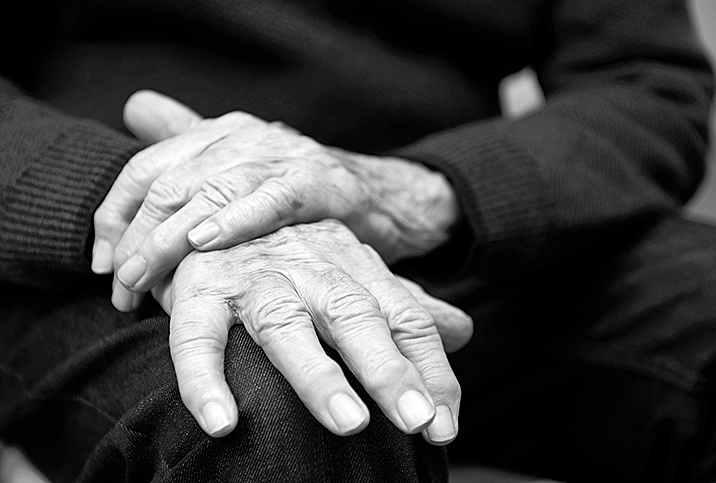The Need for Touch: Sexual Intimacy When Living With Parkinson's

Living with Parkinson's disease (PD) doesn't mean living without physical intimacy. At the disease's onset, your movements may slow and you may develop tremors and muscle rigidity, but by modifying your sexual practices and expectations of what sex is, you can experience a satisfying sex life.
Starting the conversation
"Today, we are looking at sexual satisfaction as one of the basic needs for our health," said Gila Bronner, M.P.H., a practicing sex therapist and director of Sex Therapy Domain at Tel Aviv Sourasky Medical Center in Israel.
She said sexual satisfaction is not about having an erection but rather about feeling loved.
"The number of erections, the number of ejaculations and the number of orgasms you have doesn't matter," Bronner said. "It matters that you are hugging a lot, you're touching one another. You are just taking a shower together, exciting one another but without any sexual functions."
Bronner, who is one of the leading researchers and practitioners working with Parkinson's patients, added that helping people achieve this level of intimacy and satisfaction in their lives is why she chose not only her profession as a therapist but also her work with these patients.
Bronner emphasized how important it is to initiate a conversation about a patient's sex life.
"[In 2022], we published research that was done at the movement disorders unit of the Tel Aviv Medical Center," Bronner said of the study that interviewed 78 men and 22 women. "The main question of this study was to ask them, 'Are you interested in using a counseling service in the area of sexuality and sexual functioning?' About 70 percent of them said, 'Yes, we would like to have it.' And then we asked them, 'Do you prefer that your neurologist talks to you or another healthcare professional like a therapist?' They responded, 'No, just talk to us.'"
Bronner created an open sexual communication module for healthcare professionals.
"[It] enables professionals to ask questions in a way that allows the patient to answer. The answer does not have to be that a sexual problem is shared immediately. However, the answer could be that the patient might want to talk about their sexual health later; maybe not today, but maybe at the next meeting with another doctor or expert," Bronner explained.
Clinics working with a multidisciplinary team will train neurologists, speech therapists and/or occupational therapists in an open sexual communication module, so the healthcare professionals can strategize how to "open the door" for patients to talk about their sex lives.
Engaging with Parkinson's patients and talking about sex
Heather Simpson, O.T.R./L., is an occupational therapist at the University of Florida Health Center for Movement Disorders and Neurorestoration. Although she doesn't directly refer patients to a sex therapist, she said she does talk to them about sexuality.
"[I ask] patients about their ability to engage in occupations and the ability to engage in sexual activities as a meaningful occupation," Simpson said. "We can help with neuro retraining to help with movement skills or even adaptive strategies to help one to better engage in those tasks."
She added that, when available, their physicians can refer patients to a sex therapist.
"As occupational therapists, our goal is to ensure that someone maintains their sense of who they are in their daily roles," Simpson explained. "It is very important that no matter what symptoms one might experience while living with PD, they still maintain their identity and feel empowered in their daily lives."
This process also includes intimacy and romance.
"The earlier that someone living with Parkinson's disease can get involved with a rehab team, the better their outcomes," Simpson said. "We have found that the more that someone engages in their simple daily activities, the better they feel."
Dealing with the symptoms of sexual dysfunction
In a study conducted at the Sheba Medical Center's movement disorder unit, Bronner and her fellow researchers discovered an interesting trend.
"Men with PD had more sexual desire than women," Bronner said. "But women were much more satisfied with their sexual activities than men. Why? Because one of the frequent problems that men experience with PD is erectile dysfunction (ED)."
ED often occurs with aging, but men with Parkinson's also experience movement problems and lack of concentration, Bronner said. In general, men face insecurity and uncertainty in their later years because they lose a lot of their roles, she added. They may be sad, anxious or depressed, and when they lose erections, they are not satisfied at all, because according to most cultural traditions, they are not a man if they don't have a proper erection, Bronner said.
"Women have similar problems," Bronner added. "Sometimes their vaginas will not have enough blood flow and will not be wet or lubricated enough for intercourse."
Maintaining sexual pleasure
If penetration is impossible or painful, partners can shift from intercourse to outercourse. Unlike intercourse, outercourse refers to sexual activities that do not involve penetration, which Bronner said can be effective in satisfying both partners, giving them an alternate method of having sex.
"When I talk about sexuality, I'm not talking only about stimulating the sexual organs and a person's sexual functioning," Bronner said. "I'm talking about intimacy. The right to touch, to hug, to cuddle."
To help, Bronner created a series of informational YouTube videos that explain and show how men and women living with Parkinson's can still enjoy physical intimacy.
"It's important to feel close to one another [and] to share intimate moments without the pressure of a goal but instead focus on the pleasure surrounding it," Bronner said. "In my work, I change the concept and the reason for wanting sexual pleasure. It is very important to be touched, give a massage, get a massage, hugging. Being physically close with your partner decreases anxiety, decreases pain and increases the quality of your sleeping."
Along with altering the reason for wanting sexual pleasure, Bronner is trying to dispel the idea that people are not entitled to sexual activity if they can't "have sex."
"With Parkinson's, if you have a tremor, in most cases, we don't solve it or change it," Bronner explained. "Maybe we can slow down the disease. But people with PD can have overall satisfaction, intimate satisfaction and nonsexual satisfaction."
Your quality of life and well-being
Take the opportunity to speak to your healthcare team about your sexual health. Although this may be an uncomfortable conversation, it is an essential part of your overall health and well-being.
There are many online resources to help find the right healthcare professionals and treatments for you, including the Parkinson's Foundation, the American Parkinson Disease Association and the Michael J. Fox Foundation for Parkinson's Research.


















